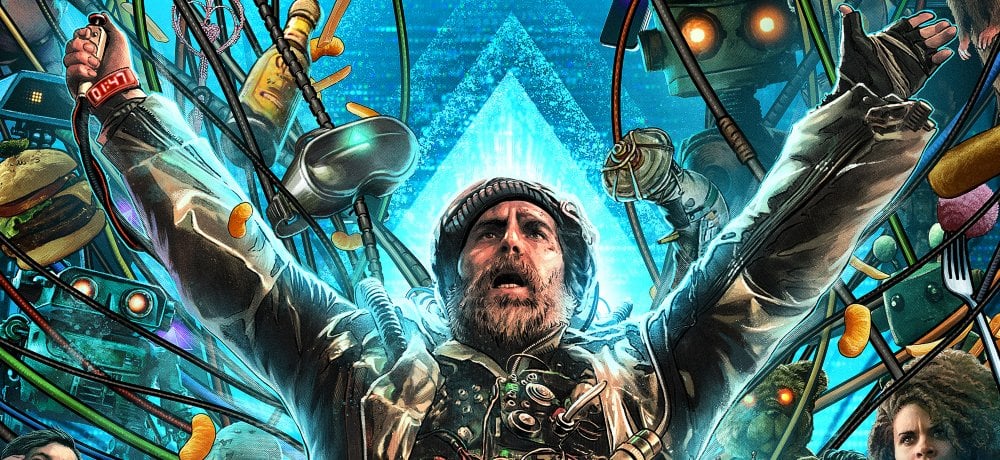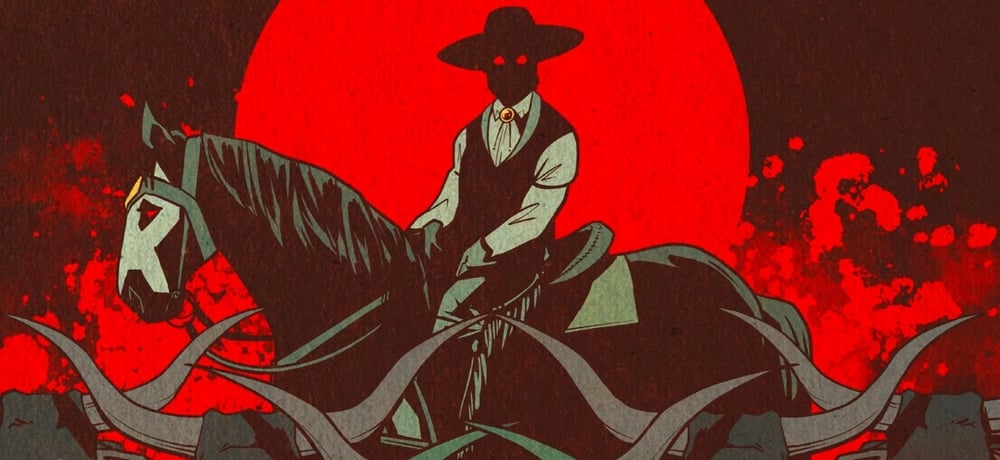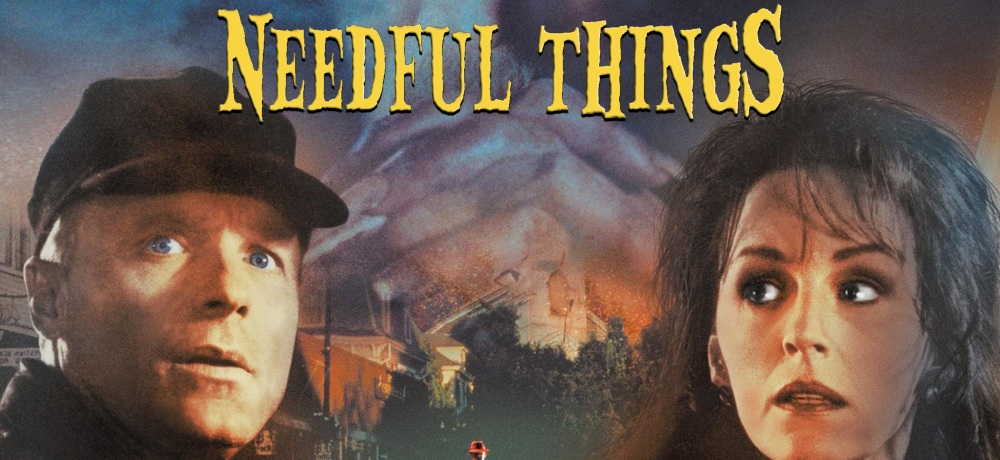






Ed Harris has popped up a few times in my Catalog From the Beyond’s coverage, which isn’t surprising considering he’s one of my favorite character actors of all time. He brings an intensity that always seems like he’s on the brink of a meltdown in any movie he’s in, from a vengeful gangster in A History of Violence to an obsessed LARPer in George Romero’s Knightriders. The dude even dances like a nut in Creepshow. As it turns out, this simmering rage is the perfect fit for the lead in another Stephen King property, 1993’s Needful Things.
Based on King’s 1991 novel, Needful Things features Harris as Castle Rock sheriff Alan Pangborn, who’s settled into what he thinks will be a quiet life after leaving the Pittsburgh police force. As the movie opens, things are looking up, as he proposed to local diner owner Polly Chalmers (Holly McClane, I mean Bonnie Bedelia). But Alan’s plans for peaceful small town living are dashed by the arrival of Leland Gaunt (Max von Sydow), whose new shop seems to always have the perfect items for any visitor, be it the Mickey Mantle baseball card coveted by young Brian (Shane Meier), Nettie Cobb’s (Amanda Plummer) beloved trinket thought broken by an abusive husband, or even a prophetic horse-racing toy that could solve all the gambling problems suffered by local boat salesman/politician/asshole Danforth Keeton (J.T. Walsh). But as you can imagine, these items aren’t free, and Gaunt collects his debts in the form of favors that soon have the townspeople at each other’s throats.
If you’re like me, you’ll only recognize the film’s director, Fraser C. Heston, because of his last name, as his father was none other than renowned actor/gun nut Charleton Heston. The younger Heston doesn’t have many other directing credits to his name beyond some TV work, including a 1990 TV movie adaptation of Treasure Island starring his old man and the 1995 family adventure film Alaska.
The dearth of additional opportunities in the horror genre could be because, by and large, critics really didn’t enjoy Needful Things. Roger Ebert gave it 1.5 out of 4 stars, calling it “one-note” and lamenting a lack of surprises. Janet Maslin was equally unkind, calling it “the most unpleasant” of all King adaptations. Time hasn’t been overly kind to the film, either, as it currently holds only a 31% Rotten Tomatoes rating with an audience score of 44%.
But here’s the thing about this Needful Things: I kinda loved it. I remember it coming out when I was around eight years old and being entirely uninterested in it given that there wasn’t a hockey mask or clawed glove to be found. But lately I’ve been getting a lot of mileage out of exploring the wilderness of early ’90s horror, when studios distanced themselves from teen slashers with more adult-focused stories that also managed to be totally bonkers.
Contrary to Ebert’s complaints, I loved that Needful Things isn’t afraid to show its hand early on and simply invites the audience to go for a ride. Of course we all know who Leland Gaunt really is from the moment he offers his first too-good-to-be-true deal (I’ll give you a hint: it rhymes with Shmatan). But that’s part of the fun. Just how are these dominoes going to fall once he’s done setting them up?
As it turns out, they do so in deeply melodramatic, almost operatic fashion, as simple acts of vandalism quickly ramp up to violent confrontation. There’s a scene when Nettie and local farmer Wilma (Valri Bromfield) attack one another with a knife and cleaver that, in another film, would have been a satisfying climax. But in Castle Rock, double homicide is just a warm-up, with shotgun duels, snipers, and church bombings laying waste to the small town.
And at the center of it all is Max von Sydow, who makes for one charming devil. Almost 20 years after The Exorcist had him fighting on the other side in the war between good and evil, von Sydow really seems to be enjoying himself as he smoothly plays the citizens of Castle Rock against one another. Even knowing what he was doing, I’ll be damned if I didn’t find myself drawn to his soothing, casual demeanor.
Then, of course, there’s Ed Harris, who as I mentioned earlier can’t seem to do laundry without clenching his jaw. That simmering rage is right at home here, as Alan Pangborn is the classic Stephen King protagonist: a deeply flawed, middle-class white man. In Pangborn’s case, we get a backstory that hints his departure from the Pittsburgh police stems from an incident where he used excessive force on a suspect (and maybe killed him?). It’s interesting that Pangborn’s anger isn’t portrayed as the thing that will defeat Gaunt, but rather a liability that may take him down along with the rest of the town.
Honestly, at least part of my interest in this film may be due to timing, as it seems eerily relevant during a pandemic that has a lot of people on edge with one another, not to mention the fact that we’re again forced to voice concern for a philosophy on policing that’s inherently violent and angry. There’s an odd sense of escapism in a film where one person is responsible for everyone’s bitterness toward one another, as opposed to the reality where we have to face the fact that it’s entrenched in our own biases, fears, and hatred.
Although, it is interesting to consider that Castle Rock seemed primed for Gaunt’s machinations before he ever set foot in the town. In particular, Walsh’s corrupt, blowhard businessman Keeton is already at odds with almost everyone in town, and convinced of a shadow government surveillance state that would seem right at home on an InfoWars comment section.
Admittedly, for as much as Needful Things circles social critique, it doesn’t necessarily have anything particularly enlightening to bring to the discussion. [Spoiler warning] Ultimately the story resolves with the discovery that Gaunt is behind the town’s collective animosity, and when he’s foiled, he basically just shrugs his shoulders, admits he’s been licked, and moves on to his next venture. There’s not much insight to be found there, but it was a pretty wild ride, and sometimes that’s enough.